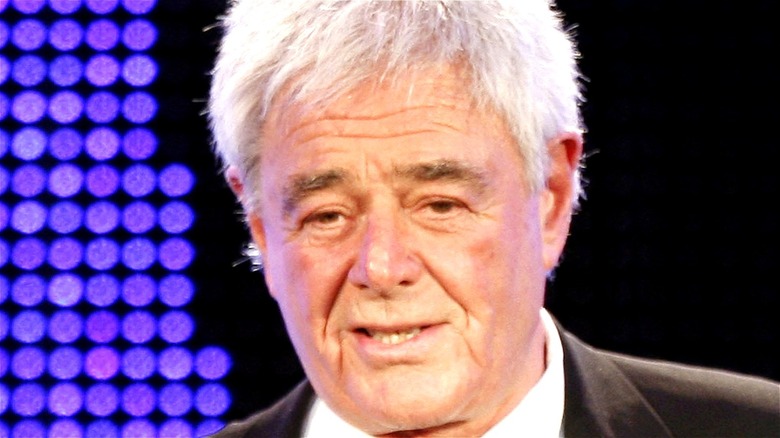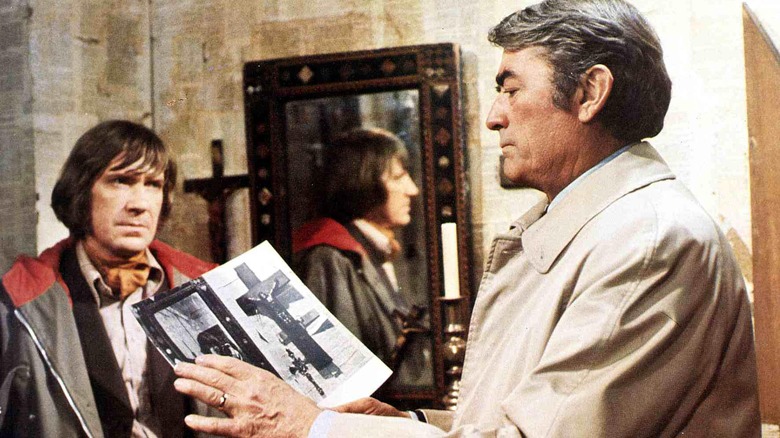How Richard Donner Changed The Horror Genre With The Omen
Richard Donner's body of work in film and television spanned multiple genres over the course of his 60-year-long career as a director. As his IMDb profile reminds us, Donner got his start on television shows like "The Twilight Zone," and he went on to make genre-defining features, including 1978's "Superman," as well as "The Goonies" and "Lethal Weapon" in the 1980s. Truly, he had incredible range as a filmmaker before his death at age 91 in July.
Donner also worked extensively in the horror genre during his lifetime. He was a major contributor to the horror anthology series "Tales from the Crypt," and he directed 1976's "The Omen." Working on the same religiously-minded horror themes that are present in 1968's "Rosemary's Baby" and 1973's "The Exorcist," "The Omen" stars Gregory Peck as American diplomat Robert Thorn and Lee Remick as his wife, Katherine. The Thorn's son dies in childbirth. Hospital chaplain Father Spiletto convinces the grieving Robert to secretly adopt another baby boy, which Robert does without telling his wife. Their son, Damien, exhibits troubling behavior as a young boy, and the Thorns learn their son may be the Antichrist. (This is why communication is so important in a marriage, folks.)
"The Omen" was a critical success (via Rotten Tomatoes), spawning several sequels and remakes, as seen in this thorough IMDb list. Following the movie's release, it's proven influential to other movies and television shows, including Terry Pratchett and Neil Gaiman's "Good Omens" (via BBC) and the Netflix movie "Little Evil" (via Inverse). While the terror of unwittingly raising a demon child is an understandably potent plot, "The Omen" also greatly impacted the horror genre, thanks to a decision made by Donner.
Richard Donner's The Omen leans into ambiguity
Previous entries in the religious horror genre made it pretty clear that the Devil was at work in their plots. The coven in "Rosemary's Baby" seems pretty insistent that the child is the Devil's son, and Regan's possession is undeniably supernatural. However, director Richard Donner took a different approach when crafting the apocalyptic horror at the core of "The Omen."
In the 1976 movie, Damien (Harvey Stephens) never appears to instigate the "accidents" around him. Although heavily implied, it's never explicitly stated that Damien is absolutely the Antichrist, with all the supernatural powers that position entails. According to Den of Geek, Donner wanted the events to be even more ambiguous, but screenwriter David Selzer and producer Harvey Bernhard sided against him.
This desire for ambiguity around Damien's behavior may stem from the shape of the movie's script when it dropped into Donner's lap in the '70s and the fact it had been floating around Hollywood for a long time. In a 2018 interview with Movies in Focus, Donner explained, "The thing is, 'The Omen' had been around for a long time. It was called 'The Antichrist,' and eventually, every studio in town turned it down. When I read it, the reason I thought they turned it down was because it was a horror film, and if they turned it into what I believed was a mystery-suspense-thriller and got rid of the cheesy cloven hoofs and devils, that maybe it would have a chance."
Donner's first adventure in ambiguity was the now-infamous "Twilight Zone" episode "Nightmare at 20,000 Feet," starring William Shatner. However, "The Omen" solidified the director's interest in the storytelling tactic and, given how influential the movie has become in the decades since its release, that decision definitely paid off.

